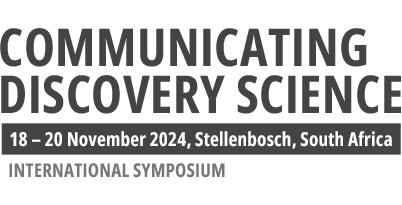PARALLEL SESSION 2 – CONSERVATION, ENVIRONMENTAL AND HEALTH SCIENCES AS PLATFORMS FOR SHARING DISCOVERY SCIENCE
Chair: Janice Limson
Rapporteur: Sabine Heij
Multifarious resources engage people with science through inclusive environmental education: A success story from the conservation sphere
Chris Eksteen (Cape Leopard Trust, South Africa)
Inclusive environmental education is crucial for engaging learners with science in nature. I will highlight the Cape Leopard Trust’s innovative approach with ‘Footprints in the Fynbos,’ a resource designed for various abilities and translated into multiple South African languages. This project incorporates accessible materials, including dyslexic-friendly fonts, Braille, audio, and sign language, enhancing literacy and environmental understanding for differently-abled children. It serves as a showcase of how science communication can break down barriers, foster inclusivity, and cultivate a deeper connection to nature.
Communicating basic science through exhibitions
Siyamthanda Ndinisa and Mbali Ngulube (NRF-SA Institute for Aquatic Biodiversity, South Africa)
This presentation will explore NRF-SAIAB’s approach to using exhibitions as dynamic platforms for bridging the gap between complex scientific concepts and public understanding. Drawing from NRF-SAIAB’s award-winning participation in the 25th Working World Exhibition in Gqeberha, we will discuss strategies for tailoring presentations to different audience demographics, the importance of relatable communication, and the impact of these exhibitions on inspiring future scientists. The talk will also emphasise the need for ongoing training in science communication and the evaluation of engagement outcomes.
Crafting engaging videos: Marine science communication through storytelling and the help of AI
Dávid Kulcsár (Dávid’s SciComm Lab, Slovakia)
This presentation highlights the use of video as an engaging tool for communicating marine science through creative storytelling. I will explore how narrative techniques, visual elements, and sound design can significantly enhance the overall quality of a video, making the content more relatable to the target audience. By integrating emerging AI tools into video production workflows, such as text-based video editing, the production process can be streamlined, making it easier and more cost-effective to create impactful, high-quality content for social media and beyond. Attendees will gain practical insights into optimising their video production workflows to improve science communication.
A review of risk communication in antimicrobial resistance: How can we do better?
Samkele Mkumbuzi (University of Cape Town, South Africa)
Co-authors: Candice Bonaconsa, Andiswa Kona, Esmita Charani, Marc Mendelson
The CAMO-net South Africa hub is part of a multinational network aimed at amplifying existing interventions to mitigate antimicrobial resistance (AMR). I have reviewed the current communication strategies regarding the risks associated with AMR to better understand how the science of improving access to vaccination, water and sanitation, and infection prevention can avert these risks, particularly in low- and middle-income countries (LMICs). Despite the significant burden of disease and mortality associated with AMR and existing avertible solutions, many challenges remain in promoting effective action through a common universal language.
Communicating science for sustainability: Empowering everyday South Africans to act
Kezia Madell (WWF South Africa)
Co-author: Kirtanya Maharaj
The World-Wide Fund for Nature’s Sustainable Seafood Initiative (WWF SASSI) is a 20-year-old programme that connects marine science and conservation to the daily lives of South Africans. WWF SASSI simplifies complex scientific information about widely consumed marine species and promotes sustainable seafood choices whilst reducing the demand for overexploited species. The engaging suite of digital, printable and gamified communication tools are designed for ocean lovers, seafood consumers, the culinary industry, and seafood suppliers and retailers. The programme is supported by science communication and behaviour change strategies aimed at fostering positive change throughout the seafood value chain, ultimately securing resilient oceans.
PARALLEL SESSION 4 – SCIENCE CENTRES AS A NERVE CENTRE FOR ENGAGEMENT
Chair: Anusuya Chinsamy-Turan
Rapporteur: Linka Maritz
Science Centres: A network platform for engaging diverse audiences with everything science
Bafedile Kgwadi and Shadrack Mkansi (National Research Foundation – South African Agency for Science and Technology Advancement, South Africa)
Co-author: Livhumani Masevhe (Department of Science and Innovation, South Africa)
The team will introduce the South African Network of Science Centres and their role in building a society that is knowledgeable about science and scientifically literate. The presentation will focus on the integral work these centres have done in engaging diverse public audiences, from early childhood development to elders within communities, across the country in basic sciences. Additionally, we will share how scientists and researchers can use the centres as a platform to engage and incorporate the various audiences in their work or conduct their basic science research work.
Umjikelezo We-Science – Taking science to the community
Tanja Reinhardt (University of KwaZulu-Natal, South Africa)
Co-authors: Derek Fish (Unizulu Science Centre); Stephen Ashworth (University of East Anglia); Busisiwe Gumede (Durban Natural Science Museum); Nokwanda Cele (Durban Natural Science Museum); Sizwe Khumalo (CASME, South Africa)
Umjikelezo We-Science is a joint project between CASME (Centre for the Advancement of Science and Mathematics Education), Durban Natural Science Museum, KZN Science Centre, STEC@UKZN (Science and Technology Education Centre, University of KwaZulu Natal), UNIZULU Science Centre and Kitchen Chemistry (University of East Anglia, UK).
The aim of Umjikelezo We-Science is to engage and promote Science, Technology, Engineering and Mathematics (STEM) to rural communities throughout KwaZulu-Natal using interactive exhibitions, hands-on workshops, and dynamic science shows. In this presentation, we will share our seven-year journey of bringing the message of Science to rural KwaZulu-Natal.
Panel: Discovery science in the Centre!
John Falk (Institute for Learning Innovation, USA)
Lynn Dierking (Institute for Learning Innovation, USA)
Derek Fish (University of Zululand, South Africa)
We have a long history, collectively bringing over 130 years of experience, in evaluating the effective communication of science across various institutions worldwide. For 55 years, Interactive Science Centres have been engaging people with discovery science by fostering emotional connections such as wonder, curiosity, and joy. In this panel, we will report on three different aspects of evaluations of public engagements presented in Science Centres, show evidence of best practice and share suggestions for monitoring, measuring and evaluating the outcomes and impacts of efforts to engage public audiences with basic, discovery science.

